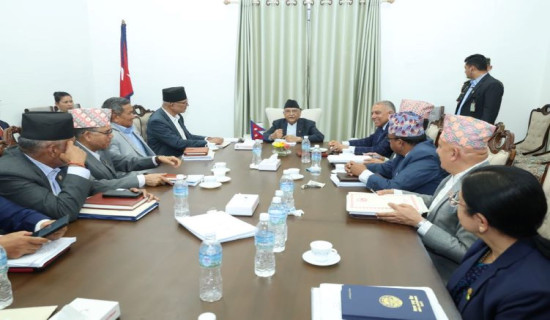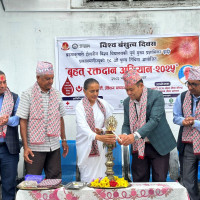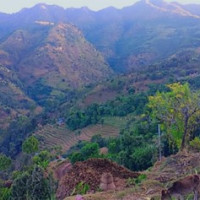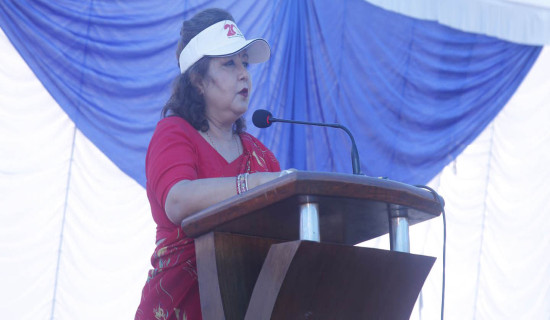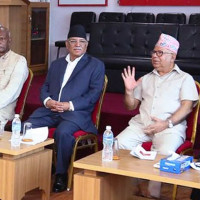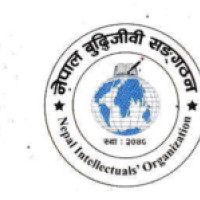- Saturday, 23 August 2025
Expressway progress remains slow despite Rs. 80 billion spent
By Anil Parajuli,Hetauda, Aug,1: The progress of Kathmandu–Tarai–Madhes Fast Track Project, one of several national pride projects, remains sluggish, despite a substantial expenditure of Rs. 80.54 billion to date.
The Expressway, slated for completion by mid-April, 2027, is being implemented under the coordination of the Nepali Army.
According to the latest data made public by the Nepali Army, the project has achieved only 42.13 per cent physical progress as of mid-July 2025. Financial progress, including mobilisation, stands at 44 per cent, said Army’s spokesperson and Brigadier General Rajaram Basnet.
Out of 13 construction packages, 12, including Packages 1 through 10, 8A, 8B, 9A, and 9B, are currently under implementation. However, progress has been stalled on Package 11 (Khokana–Dukuchhap section) due to unresolved issues related to land acquisition and the designation of the Expressway's starting point (Zero Kilo) and vehicular movement management.
The Army has said that coordination is ongoing for compensation to affected landowners and alternative design solutions are being explored. As per the approved Detailed Project Report (DPR), 160-0-2-1.67 and 165-6-0-3 ropanis of land in the Khokana–Dukuchhap area are yet to be valued and acquired. Land requirements may change following design modifications and finalisation of the starting point.
The Expressway includes seven tunnels totaling 10.979 kilometres in length. In Package No. 1, the Mahadevtar Tunnel spans 3,355 metres. Of this, 3,322 metres have been excavated, 2,029 metres (61%) on the right tunnel and 2,286 metres (68%) on the left.
Breakthroughs have been achieved in the 1,690-metre Dhedre Tunnel (Package 2) and the 1,622-metre Len Danda Tunnel (Package 3). Progress in other tunnels includes Chandram Bhir Tunnel (2,250 metres of which 99 metres excavated, Mauri Bhir Tunnel (583 metres), and portal construction ongoing.
Likewise, Devichaur Tunnel (1,000 meters), and its portal construction is ongoing and Sisautar Tunnel (390 metres) and portal construction is ongoing.
Of the 89 bridges planned, contracts for 85 have been awarded and are in the construction phase. Foundation work has been completed in 51 bridges, with 26 having full substructure and six also having superstructures completed.
Asphalt work has been completed for five km of road, while sub-base and base course work has been done for 9.3 kilometres. In Nijgadh, an underpass for wildlife has reached substructure level, and construction of a toll plaza and interchange is ongoing.
Land acquisition has been completed for the section from 24.8 km to 70.977 km. Additional approvals for 128-2-0-2.55 ropanis of land in Kathmandu for slope stabilization, 54-11-3-1.82 ropanis of land in Lalitpur for tunnel construction and 28-15-3-1.19 ropanis of land in Makwanpur for construction are yet to be completed.
To accommodate design revisions and route alignments, supplementary Environmental Impact Assessments (EIA) have been approved.
For example, a supplemental EIA for the Ranisera–Budune section (35–49 km) was endorsed by the Ministry of Forests and Environment on April 19, 2024. Subsequently, the Cabinet approved use of 51.871 hectares of national forest in Makwanpur district for road construction, including clearance of 27,748 trees. As of now, 17,846 trees have been felled.
Another EIA, approved on June 15, 2025, covers the 6.5–24 km section (Makkkhubesi to Mahadevtar), where land acquisition and deforestation approvals are in process.
The Expressway spans 70.977 kilometres, beginning in Khokana and ending in Nijgadh of Bara district. Originally assigned to the Nepali Army in 2017 with a four-year completion deadline, the project has seen significant delays.
Initially budgeted at Rs. 175 billion, the cost has now ballooned to Rs. 211.93 billion. In the last fiscal year 2024/24, a total of Rs. 13.45 billion was spent.



